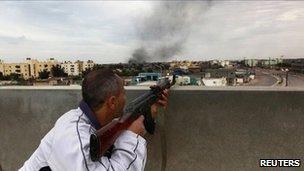Libya: Rebels 'capture Wazin post' on Tunisian border
- Published

Libyan rebels have overrun a post on the Tunisian border after government soldiers fled, say reports.
The move marks a rare advance against government troops in the west of the country and followed intense fighting in the western mountain region.
Fighting is also continuing in the western city of Misrata, where medics say more than 1,000 people have died.
The US has said it is now using Predator drones over Libya in the fight against Col Muammar Gaddafi's troops.
Defence secretary Robert Gates said use of the unmanned aircraft had been authorised by President Barack Obama and would give the US some "precision capability" in the military operation.
US Secretary of State Hillary Clinton has condemned the government's "vicious attacks" on civilians and has said she is disturbed by reports Col Gaddafi's troops are using cluster bombs against civilians.
The BBC has seen evidence suggesting Col Gaddafi is using the weapons, which can kill and maim indiscriminately over a large area.
Rebels in Misrata claim to have found remnants of the bombs but the Libyan government has so far denied the charge.
The BBC's Orla Guerin in Misrata says she has seen the bombs herself.
Doctors told our correspondent the bombs were leading to increasingly horrific injuries, with some civilians losing limbs.
UN Secretary General Ban Ki-moon has called on the Libyan authorities to "stop fighting and stop killing people" and said the UN's priority was to bring about "a verifiable and effective ceasefire".
'Defections'
Reports say the rebels seized the Wazin border post on Thursday, after up to 100 pro-Gaddafi soldiers fled to Tunisia.
The post is on the road between the Libyan town of Nalut and Dehiba in Tunisia.
Tunisia's state-run TAP news agency said an entire brigade had defected, including a brigadier-general and two majors.
Restrictions on journalists in remote areas of Libya mean it is hard to independently verify such reports.
One witness in Dehiba told Reuters news agency he could see rebels controlling the crossing.
Rebel leader Shaban Abu Sitta told the Associated Press the crossing had been taken after three days of intense battles with government soldiers outside Nalut.
Little information has emerged so far of the fighting in the mountainous western region of Libya - the area is home to Berber tribes who have long opposed Col Gaddafi.
The reported capture of the border post could open up a new supply route for the rebel fighters.
But a doctor with Tunisia's Red Crescent said there was concern among officials it could also lead to a new wave of refugees into Tunisia.
Tens of thousands of people fled into Tunisia in the early stages of the fighting, creating a humanitarian crisis on the border.
'Very sad'
There was further fierce fighting in Misrata on Thursday - at least three people were reported to have been killed.
Medical sources have told the BBC they believe more than 1,000 people have been killed there so far.
On Wednesday, two journalists died in a mortar attack in the city - Tim Hetherington, a British-American filmmaker and Chris Hondros, an American photographer.
Government spokesman Moussa Ibrahim said he was "very sad" about their deaths, but that warfare always involved casualties.
A Ukrainian doctor was also killed in a separate artillery blast in Misrata on Wednesday. The doctor's wife was reported to have been seriously injured in the incident.
The International Organization for Migration said a ship carrying 1,000 evacuated migrant workers and several injured Libyans - and the bodies of the two journalists - was due to arrive in Benghazi on Thursday evening.
Libyan rebels have been fighting Col Gaddafi's forces since February, inspired by uprisings in neighbouring Tunisia and Egypt.
The rebels, based in Benghazi, hold much of the east, while Col Gaddafi remains in control of Tripoli and most of the west.
On Wednesday they rejected the government's latest offer of a ceasefire.
A spokesman for the rebels' Transitional National Council, Abdul Hafeez Ghoga, said Col Gaddafi wanted a ceasefire because his forces were being destroyed by Nato air strikes.
But government spokesman Moussa Ibrahim told the BBC on Thursday that Nato should trust its statements and challenged them to set a date for a ceasefire.
The foreign ministry has warned there will be "consequences" to announcements by France, Italy and the UK that they are sending military advisers to Benghazi.
Meanwhile, Libya's Jana state TV has reported that Nato forces have captured a Libyan oil tanker, in what it described as "a barbaric piracy operation".
Nato is enforcing a naval blockade of Libya, as part of the international effort to prevent arms and mercenaries from entering the country.